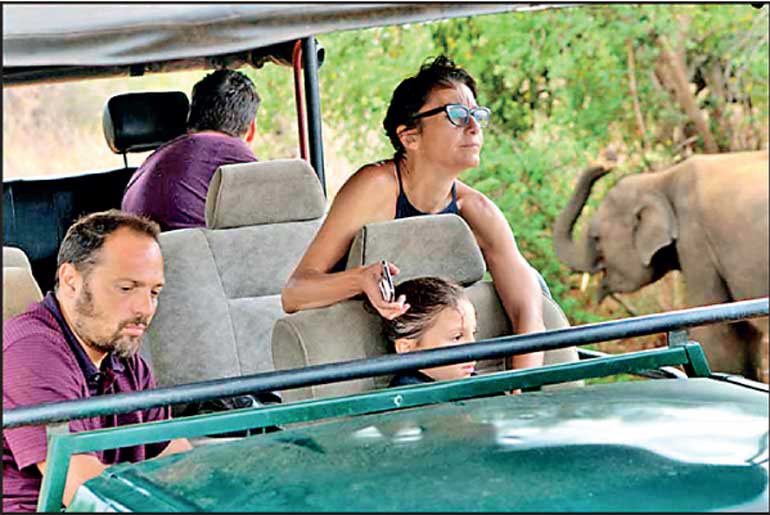Saturday Feb 21, 2026
Saturday Feb 21, 2026
Saturday, 27 April 2024 00:00 - - {{hitsCtrl.values.hits}}

Sri Lanka is renowned for its lush, verdant landscapes, and abundant wildlife
– Pic by Shehan Gunasekara
By Dinesh Kulatunga
Sri Lanka, nestled in the heart of the tropical zone, stands as a captivating tourist destination that has been drawing travellers from both the Western and Eastern hemispheres for centuries, well before colonisation.
This island nation is renowned for its enchanting climate, an abundance of natural diversity, pristine beaches, and a rich cultural heritage. This country has in its landscape a diverse range of tourist attractions spanning the entire country, offering a vicissitude and a range of options like few countries can boast of.
Whether one seeks relaxation, adventure, or cultural exploration, Sri Lanka caters to every traveller’s desires.
The climate of Sri Lanka is undeniably one of its biggest attractions. Blessed with a tropical climate, the island boasts of a year-round warmth that provides a soothing respite for those seeking to escape the chill of the West or the hustle and bustle of the East. With its consistent temperature and sunshine, Sri Lanka becomes a haven for those looking to bask in the sun, unwind on sandy shores, and indulge in water sports.
The island’s extensive coastline is adorned with picturesque beaches that captivate visitors from all corners of the globe. Whether it’s the golden sands of Unawatuna, the tranquil shores of Mirissa, or the beauty of Arugam Bay, there’s a beach to suit every traveller’s taste. From sunbathing to beachcombing, from snorkelling to scuba diving, these beaches offer a plethora of activities for beach lovers.
Sri Lanka is also steeped in a rich cultural heritage that reflects its ancient history and diverse ethnicity. The island is dotted with historical and archaeological sites that provide an insight into its vibrant past. From the awe-inspiring rock fortress of Sigiriya, an ancient kingdom’s stronghold, to the sacred city of Anuradhapura, which narrates a history spanning over two millennia, these sites offer a glimpse into the island’s cultural richness. Visitors can also explore the mesmerising cave temples of Dambulla, the exquisite Kandy Temple of the Tooth, and the colonial charm of Galle Fort.
Furthermore, Sri Lanka is renowned for its lush, verdant landscapes, and abundant wildlife. The island offers trekking through the lush rainforests of Sinharaja and safari adventures in national parks like Yala and Wilpattu, where you can encounter majestic elephants, leopards, and a diverse array of wildlife.
All the above mentioned descriptions about this multifaceted island nation truly deserves its place as a gem in the heart of the Indian Ocean.
Sri Lanka, despite its tumultuous history of colonisation and exploitation spanning over 550 years, is still in the process of cementing for itself a true independence. While the island nation faced centuries of external domination and internal political mismanagement, in more recent times, its enduring heritage holds the promise of leading it towards a brighter future. Sri Lanka in pre-colonial times was administered by monarchy and is known for its hydraulic civilisation and natural medicinal heritage and a host of traditional knowledge including a visionary education system (known as Gurukula) that bound the people to its earth and the wisdom that ensues.
The history of Sri Lanka is marked by a series of foreign invasions and colonial rule, beginning with the Portuguese in the early 16th century, followed by the Dutch and, eventually, the British. While appreciating the English based education and administration systems and industries by the Western powers, it is noted that this long period of colonisation subjected the nation to various forms of exploitation, economic hardship, and cultural upheaval. The island’s rich resources, including its spices, gems, and strategic location along trade routes, made it a coveted prize for colonial powers.
However, beneath the layers of foreign influence and exploitation, Sri Lanka retained its intrinsic beauty and cultural psyche. The resilience of its people and their commitment to preserving their traditions ensured that the country’s cultural richness endured even during challenging times.
It is no secret to the world that in the recent past, Sri Lanka faced political mismanagement and instability that hindered its progress and development. The consequences of these challenges were felt across various sectors, including the economy and governance. However, despite these setbacks, Sri Lanka hopes to emerge as a beacon of hope.
Efforts to promote eco-tourism and conservation have gained momentum, leading to the protection of endangered species and the preservation of fragile ecosystems.
Furthermore, Sri Lanka’s strategic location in the Indian Ocean has positioned it as a potential hub for global trade and commerce. Initiatives to improve infrastructure and trade relations have the potential to reinvigorate this nation’s economy and open up new opportunities for growth and development.
With consistent commitment to sustainable development, environmental conservation, and good governance, Sri Lanka has the opportunity to build a brighter future that reflects its glorious past.
(The writer is a veteran publisher in Sri Lanka who is the Chairman of the Commonwealth Publishers’ Network and holds diverse other local and international positions in the knowledge dissemination field.)